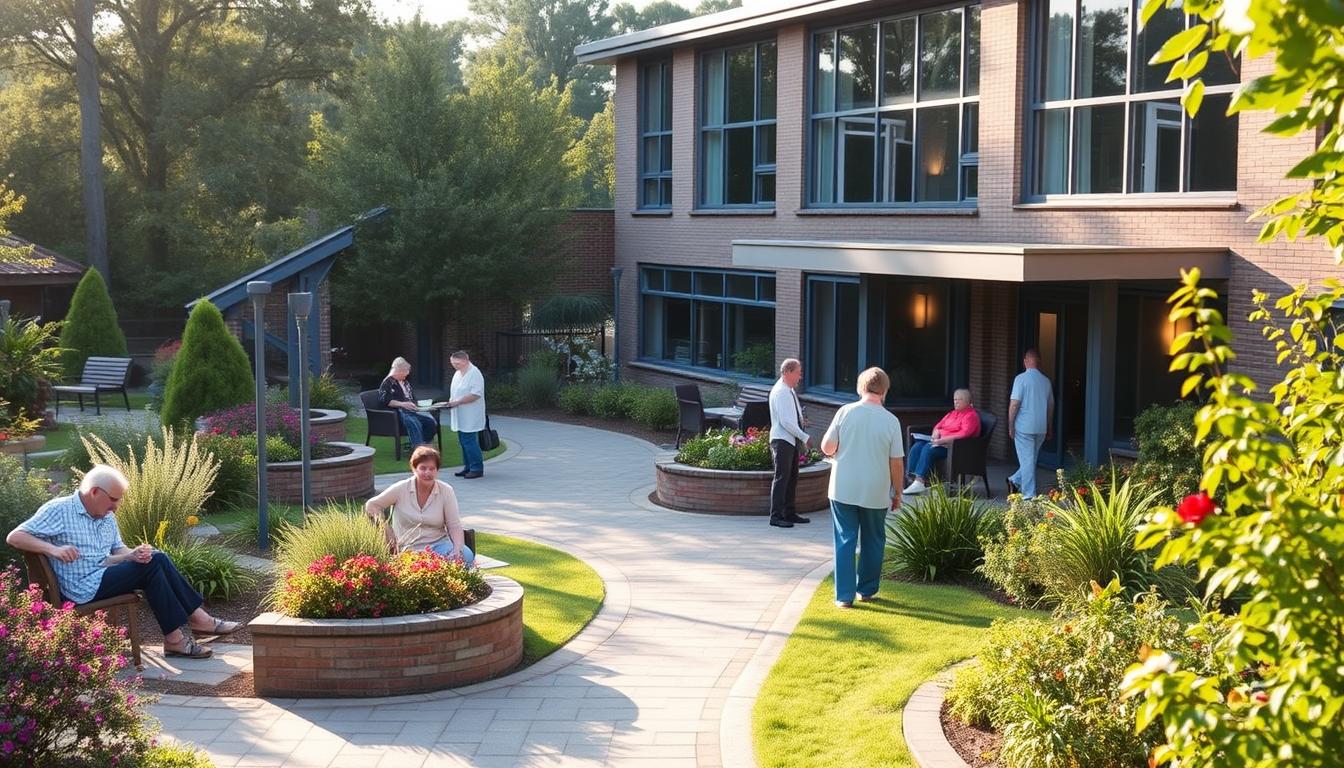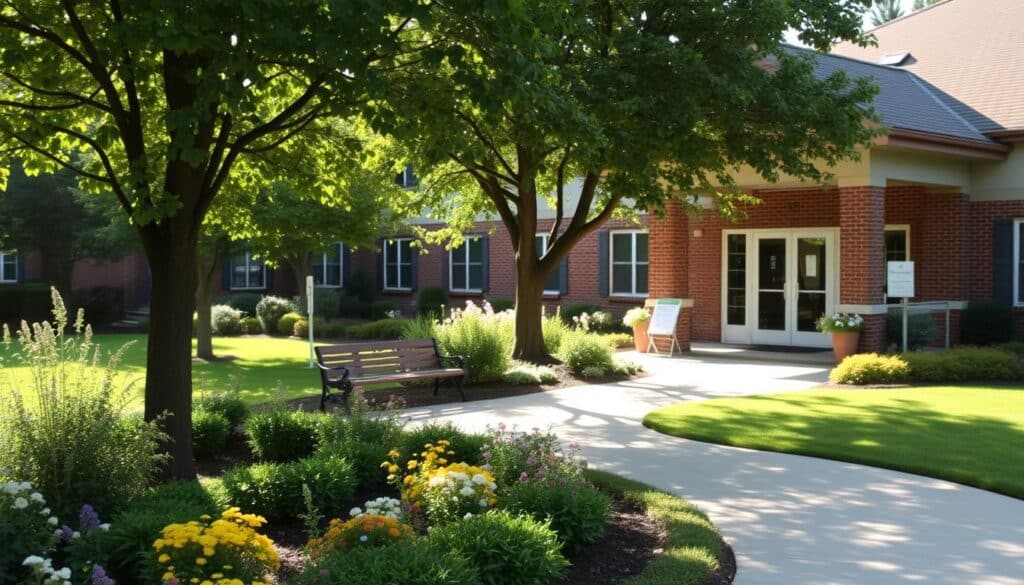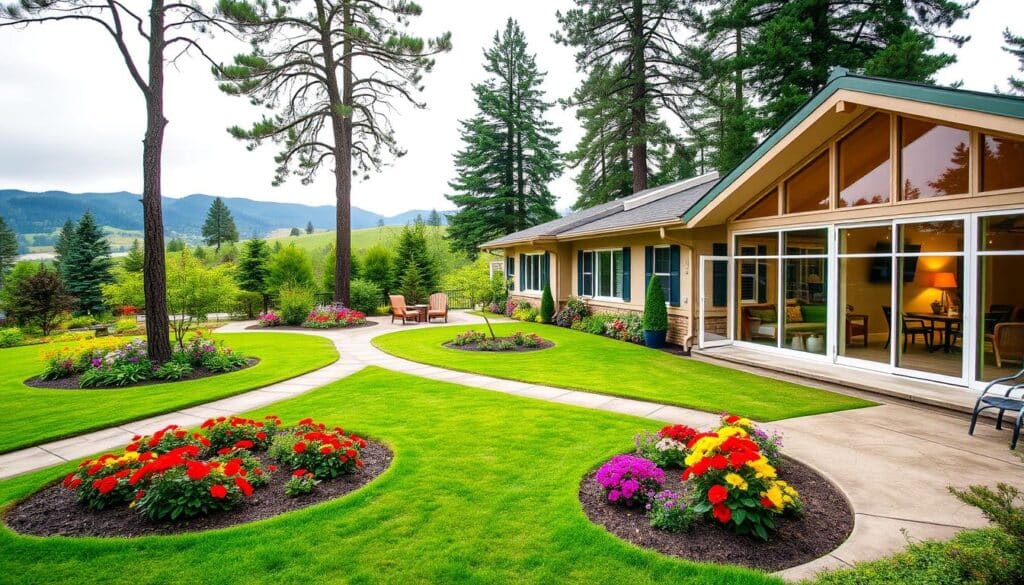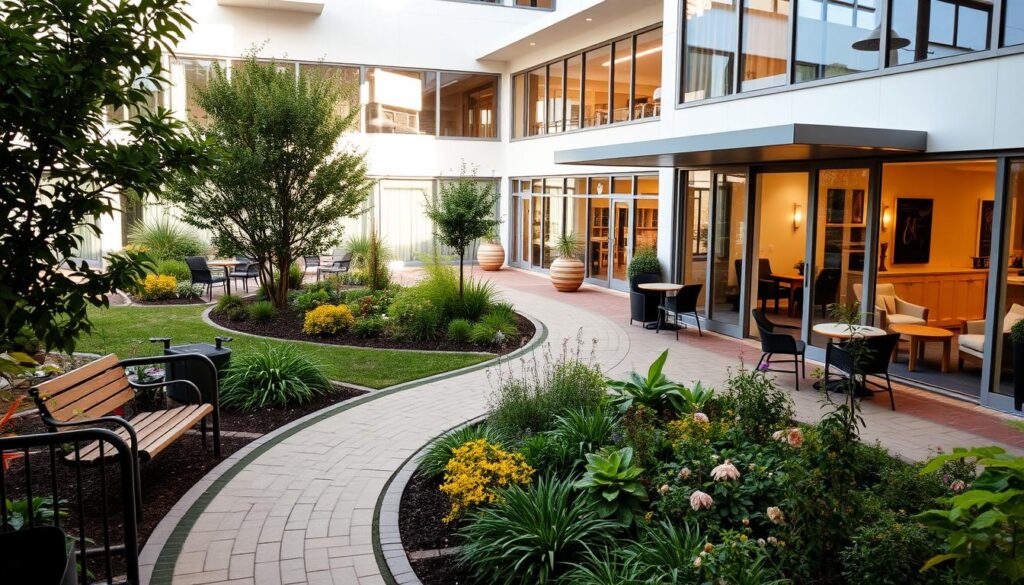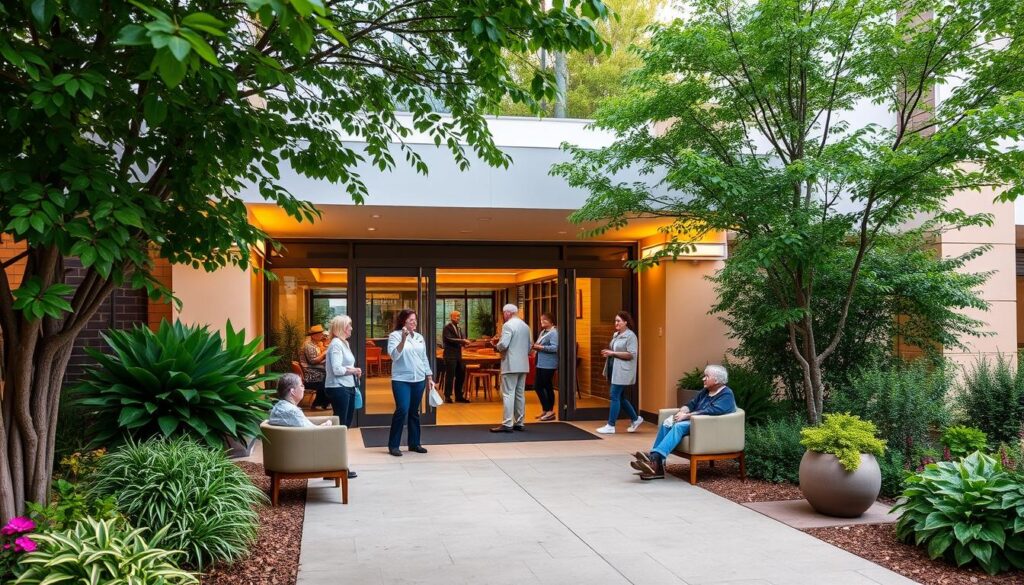Finding the right aged care facility can seem overwhelming, but knowing what to look for helps. Start by thinking about what kind of care your loved one needs now and in the future. This includes help with daily tasks, medical care, and activities that keep them engaged.
After figuring out the level of care needed, look for the right place. This could be a retirement home, assisted living, nursing home, or a special unit for Alzheimer’s or dementia care.
It’s important to check out the staff, the place itself, the activities, and the costs. This way, you can make sure the aged care facility is a good fit for your loved one’s needs and likes. Taking the time to learn about the different options and what to consider helps make better choices. This supports the well-being and quality of life of your loved ones.
Key Takeaways
- Assess the individual’s current and future care needs to determine the appropriate level of aged care
- Understand the different types of aged care facilities, such as retirement housing, assisted living, nursing homes, and Alzheimer’s/dementia care units
- Evaluate factors like staff, environment, programs, services, costs, and contract details when choosing an aged care facility
- Make informed decisions that prioritize the well-being and quality of life of the individual
- Seek guidance from healthcare professionals and conduct thorough research to find the best-suited aged care facility
Understanding the Different Types of Aged Care Facilities
There are many types of aged care facilities for older adults. Two main types are retirement housing and assisted living.
Retirement Housing
Retirement housing is for people in the early stages of Alzheimer’s or dementia who can still take care of themselves. They get some help, enjoy social activities, and have transportation. People living here can still live on their own and stay active.
Assisted Living
Assisted living offers more support. It includes housing, meals, personal care, and health services. These places can offer different services, and not all have special programs for those with dementia-friendly needs. It’s key to check if they can meet your loved one’s current and future level of care needs.
Choosing the right aged care facility is a big decision. It involves looking at the person’s needs, likes, and budget. Knowing about the different types of places and what they offer is important for making a good choice.
Nursing Homes and Skilled Nursing Facilities
Nursing homes and skilled nursing facilities (SNFs) are key for long-term care. They offer 24/7 medical care and support for those needing extra help. These places are for seniors and people with ongoing health issues. They provide services for nutrition, care planning, fun activities, and medical needs.
The government watches over these places to make sure they meet high care standards. They have strict rules about how many staff they must have for each resident. The staff includes doctors, nurses, and assistants, all trained to give care that fits each person’s needs.
Alzheimer’s Special Care Units (SCUs)
Alzheimer’s Special Care Units (SCUs) are special areas in nursing homes for people with Alzheimer’s or dementia. They have trained staff, fun activities, and safe spaces. This helps give a caring and supportive place for those with memory loss.
These units can be their own places or part of bigger communities for seniors. They focus on the unique needs of dementia patients. They aim to make living safe, comfortable, and full of life, while also helping people stay independent.
“Nursing homes and memory care units play a vital role in providing comprehensive care and support for individuals who require a higher level of assistance due to age-related or cognitive challenges.”
Aged Care Facility
An aged care facility offers a caring and supportive place for older adults. It provides services like personal care, meals, social activities, and healthcare. The goal is to make a home-like setting that respects the dignity and well-being of its residents.
These facilities offer a wide range of support for older adults who need help with daily tasks. They assist with bathing, dressing, and managing medications. They also organize social events and help with medical care to improve life quality.
Residents in these facilities feel a sense of community and belonging. They have access to comfortable spaces, recreational amenities, and social activities. This helps prevent social isolation and supports their well-being.
A team of professionals, including nurses, caregivers, social workers, and activity coordinators, work together. They create a care plan that meets each resident’s unique needs and goals. This ensures a high-quality, person-centered care experience.
Choosing an aged care facility means your loved ones will get the support and care they need. They can live independently and enjoy their golden years in a safe, supportive place.
| Services Offered | Amenities |
|---|---|
|
|
“At our aged care facility, we strive to create a warm and welcoming environment that empowers our residents to live their best lives. Our dedicated team works tirelessly to ensure that every individual’s needs are met with compassion and respect.”
Choosing an aged care facility means getting the support, care, and community needed to thrive in your golden years.
Factors to Consider When Choosing an Aged Care Facility
Choosing the right aged care facility is a big decision that affects a person’s life quality. It’s key to look at the care level needed and the environment and facilities available.
Level of Care Required
First, figure out the care needs of the individual. This could be help with daily tasks, nursing, or special care for conditions like dementia. Knowing what care is needed helps pick a place that can offer the right support.
Environment and Facilities
The environment and facilities matter a lot too. Look for cleanliness, safety, easy access, private living areas, good food options, and fun activities. These things make life better for the person living there.
It’s a good idea to visit places, talk to staff, and see for yourself if it feels right. This way, you can check if it suits the person’s needs and likes. You’ll also see how safe and nice it is.
| Factors | Considerations |
|---|---|
| Level of Care |
|
| Environment and Facilities |
|
Think about the care level and the place itself to make a good choice. This way, you focus on the person’s happiness and make sure they live in a safe, nice place.
“A good aged care facility should feel like a home, not an institution.”
Visiting and Evaluating Aged Care Facilities
Choosing the right aged care facility for your loved one is a big decision. It’s important to visit several places and check them out carefully. Look at how the staff treats the residents, the quality of programs and services, and how clean and comfortable the place is.
When looking at aged care facilities, think about these things:
- Staff Engagement: See how the staff talks to the residents. Are they kind, patient, and caring? Do they know the residents by name and talk with them in a meaningful way?
- Programs and Services: Check out the activities, therapies, and services they offer. Are they diverse and meet different needs, like social, fun, and brain-stimulating activities?
- Facility Cleanliness and Comfort: Look at how clean and well-kept the facility is. Is it a place that feels like home and encourages a sense of community?
- Resident Experiences: Talk to residents and their families to hear what they think about the care, services, and happiness they feel.
- Facility Reputation and Accreditation: Look at the facility’s inspection reports, if it’s accredited, and any awards it has won. A good reputation and accreditation show a focus on quality care.
Unannounced visits can give you a real look at how the facility works every day. By looking at several options, you can make a choice that fits the person’s needs and likes.
| Evaluation Criteria | Facility A | Facility B | Facility C |
|---|---|---|---|
| Staff Engagement | Excellent | Good | Average |
| Programs and Services | Comprehensive | Limited | Varied |
| Facility Cleanliness and Comfort | Exceptional | Satisfactory | Adequate |
| Resident Experiences | Highly Satisfied | Mixed | Mostly Positive |
| Facility Reputation and Accreditation | Accredited, Multiple Awards | Accredited | Accredited, Good Reputation |
“The staff at this facility genuinely cares about the well-being of the residents. I have never seen such attentive and compassionate care.”
Conclusion
Choosing the right aged care facility is a big decision. It’s important to think about many things. You should look at the different types of long-term care and what the person needs.
Check out the place’s environment and what services they offer. Also, do a good evaluation. This way, you can pick a place that focuses on the person’s happiness, comfort, and quality of life.
Deciding on a decision-making process can be hard, emotionally. But, finding the right aged care facility makes the move easier and creates a caring place for the person. By being informed and active, you can confidently go through this big step. This ensures your loved one gets the care and support they need.
The choice of an aged care facility is very personal. But, by looking at everything carefully, you can make a choice that fits the person’s needs and likes. This way, they get the best care and live well.
FAQs
Q: What should I consider when choosing a long-term care facility?
A: When selecting a long-term care facility, consider factors such as the facility’s license, services offered, caregivers’ qualifications, location, costs, and the types of living arrangements available, such as private or shared rooms.
Q: How do I find reputable residential care facilities?
A: To find reputable residential care facilities, you can consult the local area agency on aging, read reviews online, visit facilities in person, and ask for recommendations from healthcare professionals or friends who have experience with caregiving tips and resources.
Q: What types of care communities are available for seniors?
A: There are various types of care communities, including assisted living facilities, nursing homes, board and care homes, and specialized facilities for individuals with Alzheimer’s disease or other memory-related conditions.
Q: How can I assess the quality of care in long-term care facilities?
A: To assess the quality of care in long-term care facilities, check for state inspection reports, look at staff-to-resident ratios, inquire about staff training, and observe the interactions between caregivers and residents during your visit.
Q: Are there financial assistance options for long-term care facilities?
A: Yes, there are several financial assistance options available for long-term care facilities, including long-term care insurance, Medicaid, and Medicare. It’s important to research these options and understand what they cover to help manage costs.
Q: What social and recreational activities should I expect in residential care?
A: Many residential care facilities offer a variety of social and recreational activities designed to engage residents, such as arts and crafts, exercise programs, outings, and games, which help promote mental and physical well-being.
Q: Can I customize my loved one’s care plan in a long-term care facility?
A: Yes, most long-term care facilities may customize care plans to meet the specific needs of residents. Families should discuss individual preferences and requirements with the facility’s management to ensure proper supervision and support.
Q: What should I know about caregiver responsibilities in long-term care?
A: Caregiver responsibilities in long-term care may include assisting with activities of daily living, managing medications, and providing emotional support. Caregivers should also stay informed about caregiving tips and resources to enhance their skills.
Q: How do I handle the transition to a nursing home or assisted living facility?
A: To handle the transition to a nursing home or assisted living facility, communicate openly with your loved one about the move, involve them in decision-making, and visit frequently to help them adjust. E-alerts about caregiving tips can also provide guidance during this period.
